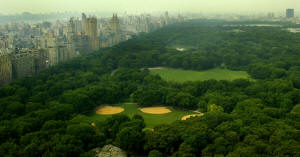New York City's Central Park a 'lab' to study climate change
 Send a link to a friend
Send a link to a friend
 [April 23, 2022]
By Christine Kiernan and Aleksandra Michalska [April 23, 2022]
By Christine Kiernan and Aleksandra Michalska
NEW YORK (Reuters) - Central Park, New York
City's 843-acre green lung created in 1858, is now a climate change
laboratory that researchers hope will help parks nationwide become more
resilient.
The Central Park Climate Lab team wants to use data from satellites and
on the ground to study seasonal patterns and how plant and animal life
respond to shifting weather.
"We also want to understand how the park is part of the solution," said
Karen Seto, professor of geography and urbanization science at the Yale
School of the Environment.
"How much carbon does the park sequester? How much cooling relief does
the park offer to both people who come to the park, but also residents
around the park?"

The lab was launched with two New York City-based nonprofits, Central
Park Conservancy and Natural Areas Conservancy, earlier this year.
"Cities are going to have to be part of the climate change solution,"
said Seto. "We're hoping to inform policy in terms of how best to manage
the assets here in the park ... so that the green space can continue to
provide cooling relief, cleaning air, etc."
[to top of second column]
|

New York's Central Park is seen looking North from atop the Essex
House Hotel on Central Park South, July 16, 2003. REUTERS/Mike Segar
MS
 Over the past decade, Central Park
has been subject to numerous extreme weather events including heavy
rain, blizzards, high winds, and extreme heat and cold.
In September 2021, Hurricane Ida dropped 3.15 inches of rain on the
park in one hour, beating the record set just 10 days prior.
Standing by an uprooted tree, Peter Haupt, tree care manager for the
Central Park Conservancy, said the project is installing tools to
measure incremental growth in trees.
The aim is to "eventually get to the point where we can make some
conclusions about how climate change is impacting the park," said
Haupt, who has worked in the park for almost 13 years.
(Reporting by Christine Kiernan and Aleksandra Michalska in New
York; Writing by Richard Chang; Editing by Rosalba O'Brien)
[© 2022 Thomson Reuters. All rights
reserved.] This
material may not be published, broadcast, rewritten or
redistributed.
Thompson Reuters is solely responsible for this content. |